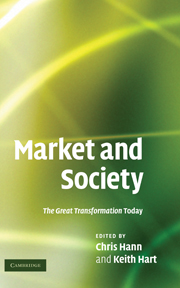Book contents
- Frontmatter
- Contents
- List of figures and table
- List of contributors
- 1 Introduction: Learning from Polanyi 1
- 2 Necessity or contingency: Mutuality and market
- 3 The great transformation of embeddedness: Karl Polanyi and the new economic sociology
- 4 The critique of the economic point of view: Karl Polanyi and the Durkheimians
- 5 Toward an alternative economy: Reconsidering the market, money, and value
- 6 Money in the making of world society
- 7 Debt, violence, and impersonal markets: Polanyian meditations
- 8 Whatever happened to householding?
- 9 Contesting The Great Transformation: Work in comparative perspective
- 10 “Sociological Marxism” in central India: Polanyi, Gramsci, and the case of the unions
- 11 Composites, fictions, and risk: toward an ethnography of price
- 12 Illusions of freedom: Polanyi and the third sector
- 13 Market and economy in environmental conservation in Jamaica
- 14 Embedded socialism? Land, labor, and money in eastern Xinjiang
- 15 Afterword: Learning from Polanyi 2
- Bibliography
- Index
5 - Toward an alternative economy: Reconsidering the market, money, and value
Published online by Cambridge University Press: 08 August 2009
- Frontmatter
- Contents
- List of figures and table
- List of contributors
- 1 Introduction: Learning from Polanyi 1
- 2 Necessity or contingency: Mutuality and market
- 3 The great transformation of embeddedness: Karl Polanyi and the new economic sociology
- 4 The critique of the economic point of view: Karl Polanyi and the Durkheimians
- 5 Toward an alternative economy: Reconsidering the market, money, and value
- 6 Money in the making of world society
- 7 Debt, violence, and impersonal markets: Polanyian meditations
- 8 Whatever happened to householding?
- 9 Contesting The Great Transformation: Work in comparative perspective
- 10 “Sociological Marxism” in central India: Polanyi, Gramsci, and the case of the unions
- 11 Composites, fictions, and risk: toward an ethnography of price
- 12 Illusions of freedom: Polanyi and the third sector
- 13 Market and economy in environmental conservation in Jamaica
- 14 Embedded socialism? Land, labor, and money in eastern Xinjiang
- 15 Afterword: Learning from Polanyi 2
- Bibliography
- Index
Summary
Karl Polanyi is widely invoked by critics of the extension and intensification of market exchange. Neoliberal globalization is now seen as another attempt to revive the self-regulating market system at all levels, from the local to the global, comparable to the national and international experience of European societies from 1830 to 1930 analyzed in The Great Transformation (Polanyi 1944). This work presents a number of possible outcomes, and various lessons may be drawn from it for social struggles and policies today. More than half a century after its publication, can we go further with its theoretical and political arguments? In his preface to the first edition of The Great Transformation, when speaking of the establishment of the United Nations, Robert Morrison MacIver notes pertinently:
Such liberal formulas as “world peace through world trade” will not suffice. If we are content with such formulas we are the victims of a dangerous and deceptive simplification. Neither a national nor an international system can depend on automatic regulation. Balanced budgets and free enterprise and world commerce and international clearing houses and currencies maintained at par will not guarantee an international order. Society alone can guarantee it; international society must also be discovered. (MacIver 1944: xi)
The same observation might be made with regard to structural adjustment, the “Washington consensus” and the World Trade Organization.
- Type
- Chapter
- Information
- Market and SocietyThe Great Transformation Today, pp. 72 - 90Publisher: Cambridge University PressPrint publication year: 2009
- 12
- Cited by



